关于英语一二单元的手抄报
四年级英语上册小报1至6单元
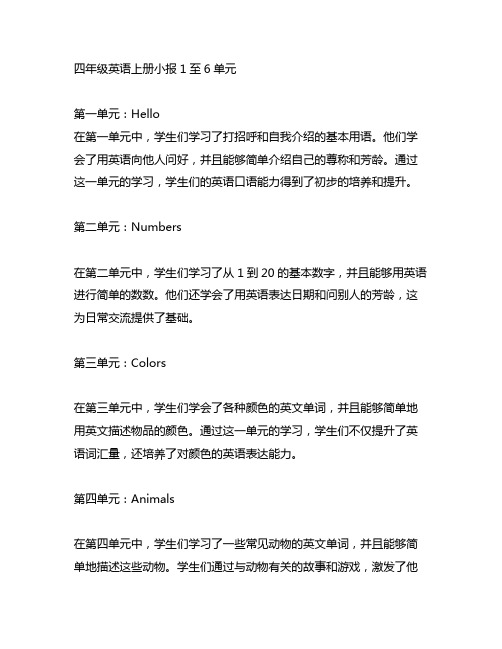
四年级英语上册小报1至6单元第一单元:Hello在第一单元中,学生们学习了打招呼和自我介绍的基本用语。
他们学会了用英语向他人问好,并且能够简单介绍自己的尊称和芳龄。
通过这一单元的学习,学生们的英语口语能力得到了初步的培养和提升。
第二单元:Numbers在第二单元中,学生们学习了从1到20的基本数字,并且能够用英语进行简单的数数。
他们还学会了用英语表达日期和问别人的芳龄,这为日常交流提供了基础。
第三单元:Colors在第三单元中,学生们学会了各种颜色的英文单词,并且能够简单地用英文描述物品的颜色。
通过这一单元的学习,学生们不仅提升了英语词汇量,还培养了对颜色的英语表达能力。
第四单元:Animals在第四单元中,学生们学习了一些常见动物的英文单词,并且能够简单地描述这些动物。
学生们通过与动物有关的故事和游戏,激发了他们学习英语的兴趣。
第五单元:Action verbs在第五单元中,学生们学习了一些常见的动作动词,并且能够用英语描述他们自己的日常活动。
通过这一单元的学习,学生们的日常生活英语表达能力得到了提升。
第六单元:Family在第六单元中,学生们学习了一些家庭成员的英文单词,并且能够简单地介绍自己的家庭情况。
这一单元的学习让学生们了解了家庭成员之间的称谓,同时也培养了他们的家庭情感。
总结:四年级英语上册小报1至6单元的学习内容丰富多彩,涵盖了打招呼、数字、颜色、动物、动作动词和家庭等多个方面的基础知识。
通过这些学习,学生们在英语口语、词汇量、日常生活表达等方面都得到了初步的提升。
希望学生们在接下来的学习中能够继续努力,不断提升英语能力。
第七单元:Daily Activities在第七单元中,学生们将学习一些日常活动的英文单词,例如吃饭、睡觉、上学等,同时学会用英语描述自己的日常活动。
这一单元的学习将进一步提升学生们的日常生活表达能力,让他们能够用英语简单而准确地描述自己的日常生活。
第八单元:Food and Drinks第八单元将引导学生学习食物和饮料的英文单词,学生将会了解许多日常生活中常见的食物和饮料,并掌握如何用英语对它们进行简单描述。
四年下册英语一、二单元单元总结手抄报+自己的收获
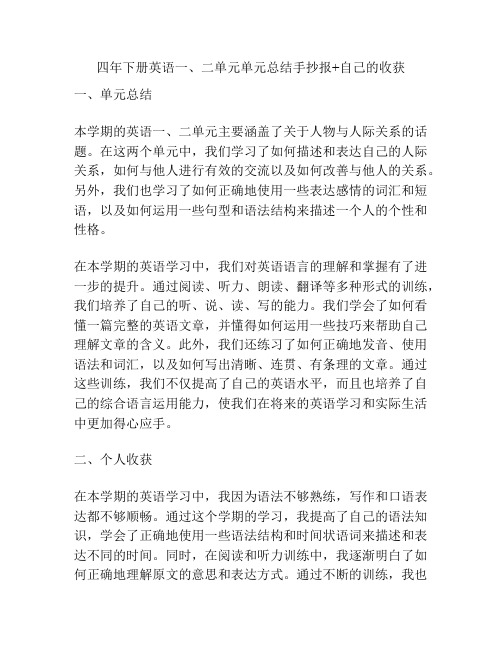
四年下册英语一、二单元单元总结手抄报+自己的收获一、单元总结本学期的英语一、二单元主要涵盖了关于人物与人际关系的话题。
在这两个单元中,我们学习了如何描述和表达自己的人际关系,如何与他人进行有效的交流以及如何改善与他人的关系。
另外,我们也学习了如何正确地使用一些表达感情的词汇和短语,以及如何运用一些句型和语法结构来描述一个人的个性和性格。
在本学期的英语学习中,我们对英语语言的理解和掌握有了进一步的提升。
通过阅读、听力、朗读、翻译等多种形式的训练,我们培养了自己的听、说、读、写的能力。
我们学会了如何看懂一篇完整的英语文章,并懂得如何运用一些技巧来帮助自己理解文章的含义。
此外,我们还练习了如何正确地发音、使用语法和词汇,以及如何写出清晰、连贯、有条理的文章。
通过这些训练,我们不仅提高了自己的英语水平,而且也培养了自己的综合语言运用能力,使我们在将来的英语学习和实际生活中更加得心应手。
二、个人收获在本学期的英语学习中,我因为语法不够熟练,写作和口语表达都不够顺畅。
通过这个学期的学习,我提高了自己的语法知识,学会了正确地使用一些语法结构和时间状语词来描述和表达不同的时间。
同时,在阅读和听力训练中,我逐渐明白了如何正确地理解原文的意思和表达方式。
通过不断的训练,我也已经习惯了用英语来表达自己的想法和意见,更加自信和自如地在英语环境下交流和表达。
另外,本学期的英语学习让我学会了如何用一种更加积极的态度去与周围的人交往。
我通过阅读一些案例和对话,了解到如何处理一些冲突和不愉快的局面,而不是情绪化地面对。
我认为积极地和他人交往,并处理好人际关系对我们的人生和事业将大有裨益。
总之,英语学习是一个长期的过程,在学习的过程中我意识到,不仅是掌握语法,丰富词汇,还要通过阅读、写作、听力、口语等方面的训练,不断进步和提高,才能真正掌握英语。
三年级英语一二单元手抄报闽教版
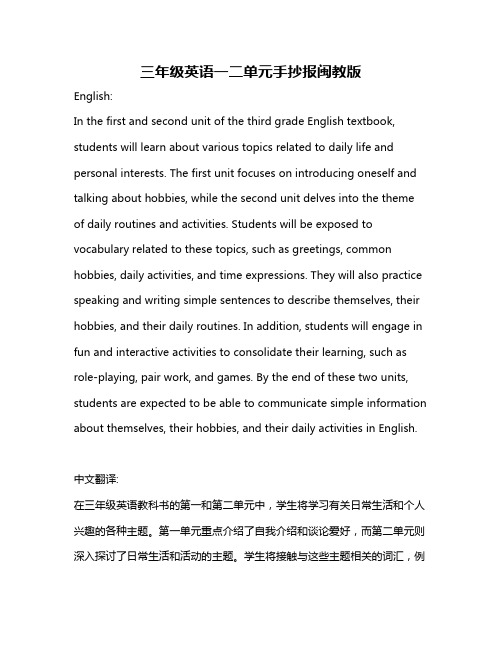
三年级英语一二单元手抄报闽教版English:In the first and second unit of the third grade English textbook, students will learn about various topics related to daily life and personal interests. The first unit focuses on introducing oneself and talking about hobbies, while the second unit delves into the theme of daily routines and activities. Students will be exposed to vocabulary related to these topics, such as greetings, common hobbies, daily activities, and time expressions. They will also practice speaking and writing simple sentences to describe themselves, their hobbies, and their daily routines. In addition, students will engage in fun and interactive activities to consolidate their learning, such as role-playing, pair work, and games. By the end of these two units, students are expected to be able to communicate simple information about themselves, their hobbies, and their daily activities in English.中文翻译:在三年级英语教科书的第一和第二单元中,学生将学习有关日常生活和个人兴趣的各种主题。
英语手抄报简单又漂亮五上1~2单元
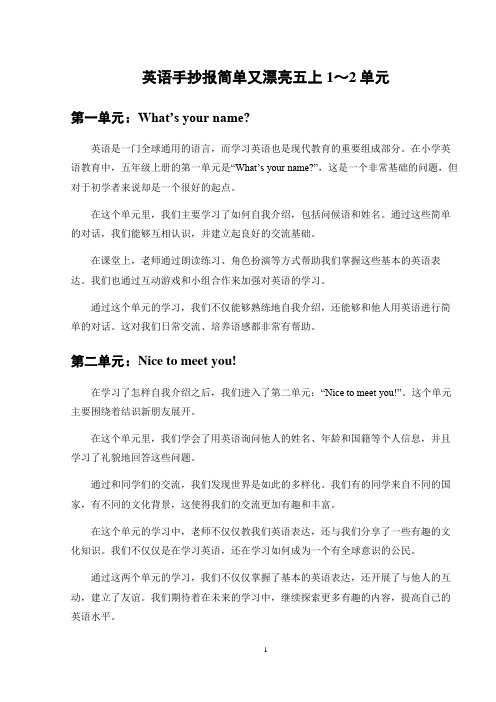
英语手抄报简单又漂亮五上1~2单元第一单元:What’s your name?英语是一门全球通用的语言,而学习英语也是现代教育的重要组成部分。
在小学英语教育中,五年级上册的第一单元是“What’s your name?”,这是一个非常基础的问题,但对于初学者来说却是一个很好的起点。
在这个单元里,我们主要学习了如何自我介绍,包括问候语和姓名。
通过这些简单的对话,我们能够互相认识,并建立起良好的交流基础。
在课堂上,老师通过朗读练习、角色扮演等方式帮助我们掌握这些基本的英语表达。
我们也通过互动游戏和小组合作来加强对英语的学习。
通过这个单元的学习,我们不仅能够熟练地自我介绍,还能够和他人用英语进行简单的对话。
这对我们日常交流、培养语感都非常有帮助。
第二单元:Nice to meet you!在学习了怎样自我介绍之后,我们进入了第二单元:“Nice to meet you!”。
这个单元主要围绕着结识新朋友展开。
在这个单元里,我们学会了用英语询问他人的姓名、年龄和国籍等个人信息,并且学习了礼貌地回答这些问题。
通过和同学们的交流,我们发现世界是如此的多样化。
我们有的同学来自不同的国家,有不同的文化背景,这使得我们的交流更加有趣和丰富。
在这个单元的学习中,老师不仅仅教我们英语表达,还与我们分享了一些有趣的文化知识。
我们不仅仅是在学习英语,还在学习如何成为一个有全球意识的公民。
通过这两个单元的学习,我们不仅仅掌握了基本的英语表达,还开展了与他人的互动,建立了友谊。
我们期待着在未来的学习中,继续探索更多有趣的内容,提高自己的英语水平。
以上就是五年级上册的第一和第二单元的学习内容。
学习英语是一项持久的任务,而这些基础的内容为我们打下了坚实的基础。
在以后的学习中,我们将继续努力,提高自己的英语能力。
希望大家也能加入我们,一起享受学习英语的过程!。
英语单元知识点归纳手抄报一二单元
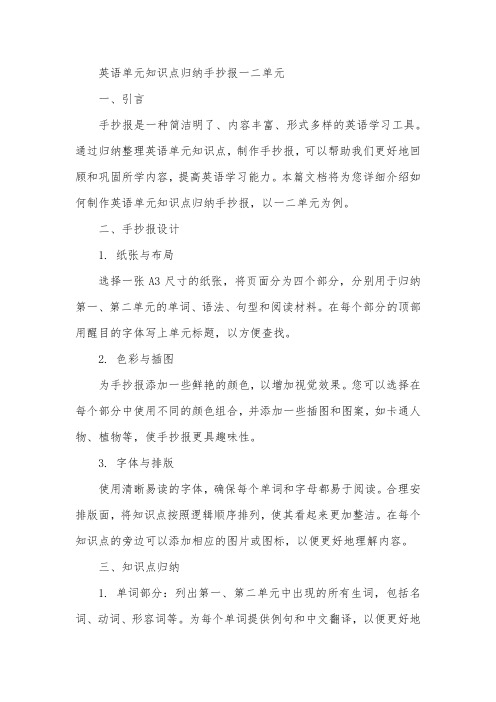
英语单元知识点归纳手抄报一二单元一、引言手抄报是一种简洁明了、内容丰富、形式多样的英语学习工具。
通过归纳整理英语单元知识点,制作手抄报,可以帮助我们更好地回顾和巩固所学内容,提高英语学习能力。
本篇文档将为您详细介绍如何制作英语单元知识点归纳手抄报,以一二单元为例。
二、手抄报设计1. 纸张与布局选择一张A3尺寸的纸张,将页面分为四个部分,分别用于归纳第一、第二单元的单词、语法、句型和阅读材料。
在每个部分的顶部用醒目的字体写上单元标题,以方便查找。
2. 色彩与插图为手抄报添加一些鲜艳的颜色,以增加视觉效果。
您可以选择在每个部分中使用不同的颜色组合,并添加一些插图和图案,如卡通人物、植物等,使手抄报更具趣味性。
3. 字体与排版使用清晰易读的字体,确保每个单词和字母都易于阅读。
合理安排版面,将知识点按照逻辑顺序排列,使其看起来更加整洁。
在每个知识点的旁边可以添加相应的图片或图标,以便更好地理解内容。
三、知识点归纳1. 单词部分:列出第一、第二单元中出现的所有生词,包括名词、动词、形容词等。
为每个单词提供例句和中文翻译,以便更好地理解单词用法。
2. 语法部分:总结第一、第二单元中出现的语法知识点,如动词时态、名词单复数、代词用法等。
为每个知识点提供例句和解释,以便更好地掌握语法规则。
3. 句型部分:列举第一、第二单元中出现的常用句型,如问候语、感谢语、道歉语等。
为每个句型提供例句和中文翻译,以便更好地运用英语进行交流。
4. 阅读材料部分:选择第一、第二单元中的一篇阅读材料,对其进行简要概括和评价。
列出文章中的生词、语法点和句型,以便更好地理解文章内容和提高阅读能力。
四、手抄报制作步骤1. 准备材料:准备好A3尺寸的纸张、彩色笔、直尺、橡皮等工具。
如果需要使用图片或图表,还需准备相关素材。
2. 规划布局:在纸张上画出四个部分,分别用于第一、第二单元的单词、语法、句型和阅读材料。
在每个部分的顶部写上标题。
3. 开始书写:按照规划布局,分别在每个部分中书写相应的知识点。
英语五年级二单元手抄

以下是一份五年级英语第二单元的手抄报示例:
标题:五年级英语第二单元手抄报
内容:
1.单词:
2.subject(科目)
3.math(数学)
4.science(科学)
5.Chinese(语文)
6.English(英语)
7.PE(体育)
8.music(音乐)
9.art(美术)
句子:
1.What’s your favorite subject? 你最喜欢的科目是什么?
2.I like math. 我喜欢数学。
3.My favorite subject is science. 我最喜欢的科目是科学。
4.I don’t like English. 我不喜欢英语。
5.When do you have PE class? 你什么时候上体育课?
6.We have music class on Monday. 我们星期一有音乐课。
7.Art is my favorite subject. 美术是我最喜欢的科目。
手抄报版面设计:
1.在手抄报上方居中位置写上标题。
2.在标题下方画出5个相框,分别标注subject、math、science、Chinese、English、PE、
music和art等单词。
3.在每个相框内分别写上相应的单词和句子,可以使用不同颜色的笔进行书写,以增加视
觉效果。
4.可以根据需要添加一些插图,例如画一个钟表表示课程时间、画一个数学符号表示数学
等。
5.最后,在手抄报下方写上自己的名字和日期,以完成整个手抄报的制作。
四年级下册英语手抄报一二三单元
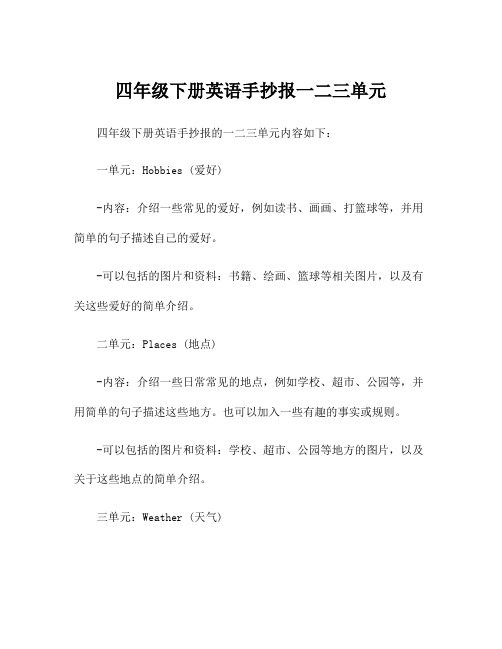
四年级下册英语手抄报一二三单元四年级下册英语手抄报的一二三单元内容如下:
一单元:Hobbies (爱好)
-内容:介绍一些常见的爱好,例如读书、画画、打篮球等,并用简单的句子描述自己的爱好。
-可以包括的图片和资料:书籍、绘画、篮球等相关图片,以及有关这些爱好的简单介绍。
二单元:Places (地点)
-内容:介绍一些日常常见的地点,例如学校、超市、公园等,并用简单的句子描述这些地方。
也可以加入一些有趣的事实或规则。
-可以包括的图片和资料:学校、超市、公园等地方的图片,以及关于这些地点的简单介绍。
三单元:Weather (天气)
-内容:介绍一些常见的天气情况,如晴天、阴天、下雨等,并用简单的句子描述每种天气的特点。
也可以加入一些与天气相关的活动或建议。
-可以包括的图片和资料:各种天气情况的图片,以及关于每种天气的简单介绍。
希望以上内容可以帮助到您,祝您手抄报制作顺利!如有其他问题,请随时提问。
四上英语1至6单元小报简单版
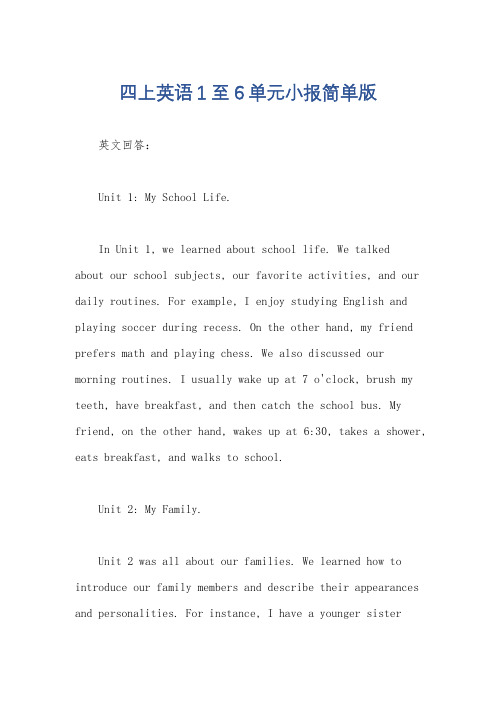
四上英语1至6单元小报简单版英文回答:Unit 1: My School Life.In Unit 1, we learned about school life. We talkedabout our school subjects, our favorite activities, and our daily routines. For example, I enjoy studying English and playing soccer during recess. On the other hand, my friend prefers math and playing chess. We also discussed our morning routines. I usually wake up at 7 o'clock, brush my teeth, have breakfast, and then catch the school bus. My friend, on the other hand, wakes up at 6:30, takes a shower, eats breakfast, and walks to school.Unit 2: My Family.Unit 2 was all about our families. We learned how to introduce our family members and describe their appearances and personalities. For instance, I have a younger sisterwho has long brown hair and is very friendly. My dad istall and has a beard, while my mom is short and has curly hair. We also talked about our family activities. On weekends, my family likes to go hiking or have a picnic in the park. We enjoy spending quality time together.Unit 3: My Friends.In Unit 3, we discussed our friends and how to describe them. I have many friends, but my best friend is Jack. Heis funny, kind, and always there for me when I need him. We often hang out together and play video games or go to the movies. On the other hand, my other friend, Sarah, is more serious and studious. She helps me with my homework and we often study together. It's great to have different types of friends who bring different qualities into my life.Unit 4: My Hobbies.Unit 4 focused on our hobbies and interests. We shared what we like to do in our free time. Personally, I enjoy playing the guitar and painting. I find it relaxing and itallows me to express my creativity. On the other hand, my friend enjoys playing basketball and cooking. We often exchange ideas and share our hobbies with each other. It's interesting to learn about different hobbies and try new things.Unit 5: My Daily Routine.Unit 5 was all about our daily routines. We learned how to talk about our activities from morning to night. In the morning, I wake up, brush my teeth, and have breakfast. Then, I go to school and attend my classes. After school, I do my homework, have dinner, and spend some time with my family. Before going to bed, I read a book or listen to music. It's important to have a structured daily routine to stay organized and make the most of our time.Unit 6: My Future.In Unit 6, we discussed our future plans and aspirations. We talked about what we want to be when we grow up and how we can achieve our goals. For example, Iwant to become a doctor and help people. I plan to study hard and go to medical school. My friend, on the other hand, wants to become a teacher and make a difference inchildren's lives. We support each other's dreams and encourage each other to work towards our goals.中文回答:第一单元,我的学校生活。
英语五年级下册英语1至四单元手抄报内容
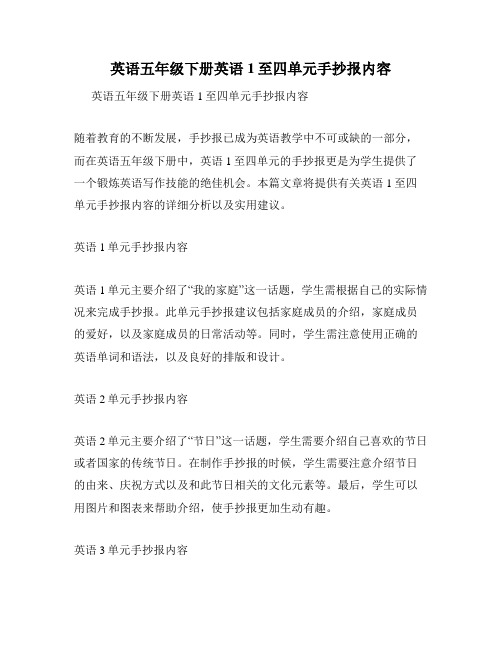
英语五年级下册英语1至四单元手抄报内容英语五年级下册英语1至四单元手抄报内容随着教育的不断发展,手抄报已成为英语教学中不可或缺的一部分,而在英语五年级下册中,英语1至四单元的手抄报更是为学生提供了一个锻炼英语写作技能的绝佳机会。
本篇文章将提供有关英语1至四单元手抄报内容的详细分析以及实用建议。
英语1单元手抄报内容英语1单元主要介绍了“我的家庭”这一话题,学生需根据自己的实际情况来完成手抄报。
此单元手抄报建议包括家庭成员的介绍,家庭成员的爱好,以及家庭成员的日常活动等。
同时,学生需注意使用正确的英语单词和语法,以及良好的排版和设计。
英语2单元手抄报内容英语2单元主要介绍了“节日”这一话题,学生需要介绍自己喜欢的节日或者国家的传统节日。
在制作手抄报的时候,学生需要注意介绍节日的由来、庆祝方式以及和此节日相关的文化元素等。
最后,学生可以用图片和图表来帮助介绍,使手抄报更加生动有趣。
英语3单元手抄报内容英语3单元主要介绍了“我的学校”这一话题,学生需要介绍自己所在的学校、学校的设施和学校的文化。
在制作手抄报时,学生可以使用图片和图表来介绍学校的设施和文化,同时需注意使用正确的英语单词和语法,以及良好的排版和设计。
英语4单元手抄报内容英语4单元主要介绍了“如何保护地球”这一话题,学生需要介绍如何保护地球以及环保的一些措施。
在制作手抄报时,学生需注重内容和布局的整体性,使用有趣的图片和图表来帮助介绍。
同时,学生可以通过引用研究数据和环保口号等方式来增强手抄报的实用性。
总结在制作英语五年级下册英语1至四单元手抄报时,学生需要注重语法、单词和设计等方面的准确性。
同时,学生需要注重手抄报的内容和布局的整体性,使用有趣的图片和介绍方式来使手抄报更加生动有趣,有助于提高英语写作技能。
最后,学生需要经常和老师和同学互动,以便更好地提高写作水平。
七年级英语l一9单元知识点手抄报
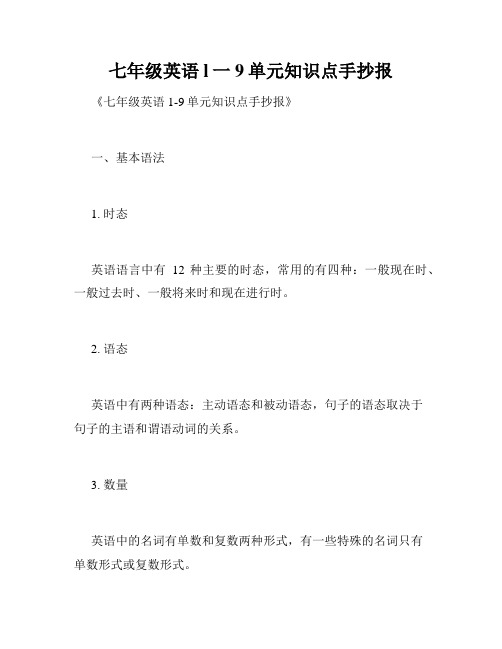
七年级英语l一9单元知识点手抄报《七年级英语1-9单元知识点手抄报》一、基本语法1. 时态英语语言中有12种主要的时态,常用的有四种:一般现在时、一般过去时、一般将来时和现在进行时。
2. 语态英语中有两种语态:主动语态和被动语态,句子的语态取决于句子的主语和谓语动词的关系。
3. 数量英语中的名词有单数和复数两种形式,有一些特殊的名词只有单数形式或复数形式。
二、基本词汇1. 表示时间的词汇时间是语言中非常重要的部分,学会对时间的表达可以更好的进行交流。
常用的词汇有时间表达方式(如:昨天、今天、明天)和时间点(如:11:30、7:00pm)。
2. 表示地点的词汇常用的表示地点的词汇有:home、office、school、park等。
3. 常用动词和动词短语英语中的动词非常重要,常用的动词有:go、come、see、take 等。
而常用的动词短语包括:get up、go to bed、have breakfast等。
三、基本句型1. 简单句简单句是最基本的句子形式,由主语和谓语组成。
例如:I run.2. 复合句复合句是由两个或两个以上简单句组成的句子,由主句和一个或多个从句组成。
例如:I love the book that you gave me.四、基本对话1. 问候语在进行英语交流时,问候语非常重要。
例如:Hello、How are you?等等。
2. 关于问路问路是英语交流中常见的情况,这时需要掌握一些常用的表达方式。
例如:Excuse me, can you tell me how to get to the nearest station?五、常用口语表达1. 祝贺祝贺在进行英语交流中也是很常见的,例如:Congratulations!、Well done!等等。
2. 道歉道歉也是进行英语交流中的一种表达方式。
例如:I'm sorry about what happened.。
五年级下册英语1至5单元英手抄报简单版
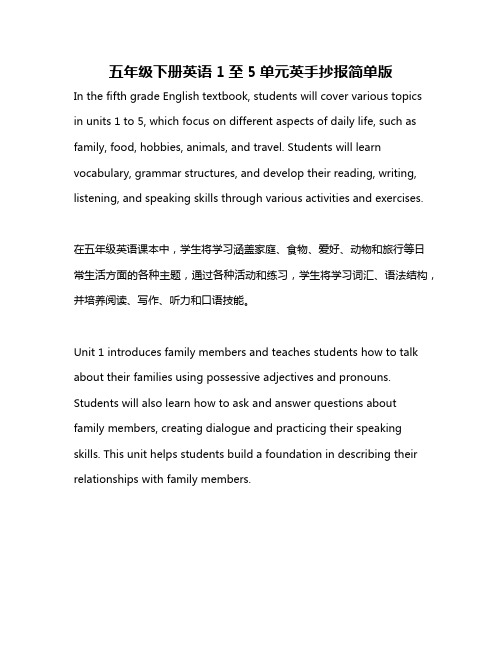
五年级下册英语1至5单元英手抄报简单版In the fifth grade English textbook, students will cover various topics in units 1 to 5, which focus on different aspects of daily life, such as family, food, hobbies, animals, and travel. Students will learn vocabulary, grammar structures, and develop their reading, writing, listening, and speaking skills through various activities and exercises.在五年级英语课本中,学生将学习涵盖家庭、食物、爱好、动物和旅行等日常生活方面的各种主题,通过各种活动和练习,学生将学习词汇、语法结构,并培养阅读、写作、听力和口语技能。
Unit 1 introduces family members and teaches students how to talk about their families using possessive adjectives and pronouns. Students will also learn how to ask and answer questions about family members, creating dialogue and practicing their speaking skills. This unit helps students build a foundation in describing their relationships with family members.第一单元介绍了家庭成员,并教给学生如何使用物主形容词和代词谈论自己的家庭。
七年级下册英语手抄报1一12单元
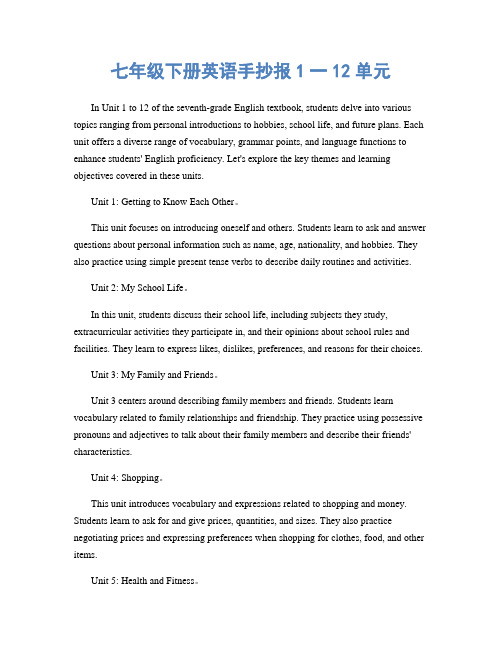
七年级下册英语手抄报1一12单元In Unit 1 to 12 of the seventh-grade English textbook, students delve into various topics ranging from personal introductions to hobbies, school life, and future plans. Each unit offers a diverse range of vocabulary, grammar points, and language functions to enhance students' English proficiency. Let's explore the key themes and learning objectives covered in these units.Unit 1: Getting to Know Each Other。
This unit focuses on introducing oneself and others. Students learn to ask and answer questions about personal information such as name, age, nationality, and hobbies. They also practice using simple present tense verbs to describe daily routines and activities.Unit 2: My School Life。
In this unit, students discuss their school life, including subjects they study, extracurricular activities they participate in, and their opinions about school rules and facilities. They learn to express likes, dislikes, preferences, and reasons for their choices.Unit 3: My Family and Friends。
四年下册英语一、二单元单元总结手抄报+自己的收获
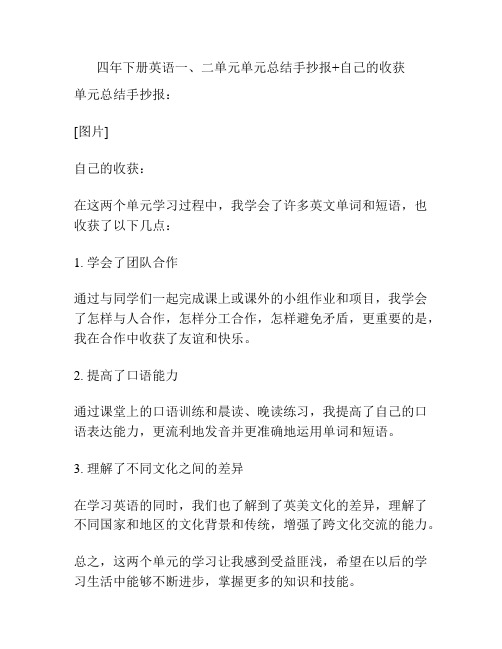
四年下册英语一、二单元单元总结手抄报+自己的收获
单元总结手抄报:
[图片]
自己的收获:
在这两个单元学习过程中,我学会了许多英文单词和短语,也收获了以下几点:
1. 学会了团队合作
通过与同学们一起完成课上或课外的小组作业和项目,我学会了怎样与人合作,怎样分工合作,怎样避免矛盾,更重要的是,我在合作中收获了友谊和快乐。
2. 提高了口语能力
通过课堂上的口语训练和晨读、晚读练习,我提高了自己的口语表达能力,更流利地发音并更准确地运用单词和短语。
3. 理解了不同文化之间的差异
在学习英语的同时,我们也了解到了英美文化的差异,理解了不同国家和地区的文化背景和传统,增强了跨文化交流的能力。
总之,这两个单元的学习让我感到受益匪浅,希望在以后的学习生活中能够不断进步,掌握更多的知识和技能。
六年级上册英语第一二单元手抄报模板

六年级上册英语第一二单元手抄报模板全文共3篇示例,供读者参考篇1Units 1 and 2 English Handwritten ReportBy: A 6th Grade StudentHi everyone! For our latest English handwritten report, we're going to cover all the awesome stuff we learned in Units 1 and 2 of our textbook. Get ready for tons of helpful vocabulary, cool grammar points, and fun reading passages!Unit 1 - My DayThis unit was all about daily routines and talking about our schedules. We learned a bunch of new vocabulary words like "wake up", "have breakfast", "get dressed", "go to school", and more. Verbs were a big focus as we practiced using them to describe our day from morning to night.One of my favorite activities was making a daily schedule and presenting it to the class. I loved hearing about everyone's different routines and all the various activities we fit into ourdays. Sports practices, music lessons, family time - we lead such busy but exciting lives!The reading passage about a kid named Michael and his typical weekday was pretty relatable too. Like Michael, I have to wake up early, rush to get ready, then head off to school for a full day of learning. No sleeping in for us students!Of course, we can't forget about grammar. This unit introduced the SIMPLE PRESENT TENSE in a big way. We worked on sentence structures like "I wake up at 7 AM" and "She brushes her teeth after breakfast." Using frequency adverbs like "always", "usually", and "sometimes" was great practice.Unit 2 - My AbilitiesAfter covering our daily routines, we moved on to talking about our skills and abilities in Unit 2. We added a ton of new vocabulary to our brains, like "draw", "play the violin", "solve math problems", and "speak Chinese." Expressing what we can and can't do was the name of the game.My personal favorite activity was the fun survey we took about our classmates' talents. Finding out who is a brilliant artist, who is a computer coding whiz, and who has incredible athleticabilities was so cool! We've got a pretty gifted group of students in our class.The reading about Samantha's different skills like swimming, singing, and helping with chores around the house had me inspired to develop more of my own abilities. I definitely want to be a multi-talented person when I grow up.For grammar, we focused on the pattern "can/can't + VERB" to talk about abilities. Sentences like "I can run very fast" and "He can't play the guitar" became second nature. We also started using adverbs like "well" and "easily" to provide more details.Of course, no English unit would be complete without some writing practice. Whether it was journaling about our morning routine or describing our hidden talents to a pen pal, putting our new vocabulary and grammar to use really helped solidify everything.That's a wrap on Units 1 and 2 of our latest English adventure! I don't know about you, but I feel like my English skills have gotten an incredible boost already. Mastering daily routine vocabulary and ability expressions is going to make communication so much easier.I can't wait to see what Units 3 and 4 have in store. Maybe we'll cover interesting hobbies, fun weekend activities, or cool places we've visited. Knowing our awesome English class, I'm sure it'll be packed with engaging material to keep expanding our language proficiency.Thanks for reading my handwritten report! I put a lot of effort into making it fun, informative, and filled with examples straight from Units 1 and 2. I hope it gets you excited about everything we're learning together in English class. See you next time!篇2Units 1 & 2 English Handwritten ReportHey there! I'm super excited to share with you all the awesome things I learned in Units 1 and 2 of our 6th grade English textbook. Get ready for an epic journey through some really cool topics!Unit 1 was all about "My Day." We explored different daily routines and activities that people do. It was so interesting to see how the same types of activities can look really different for different people based on their cultures, jobs, ages, and lifestyles.One of the first things we learned were words for common daily activities like "wake up," "get dressed," "have breakfast," and "go to school/work." Then we dove into telling time and describing our schedules using phrases like "in the morning," "at noon," and "in the evening." I thought it was neat how English uses "a.m." for morning times and "p.m." for evening times.We read some awesome stories about kids from different countries and how their daily routines compared to each other and to our own lives. My favorite was the one about the young Tibetan monk who wakes up at 4am for morning prayers! I could never wake up that early. We also learned how to ask questions like "What time do you start school?" to find out about other people's schedules.Another big part of this unit was learning to use phrases like "first, next, then, after that" to sequence and describe the steps of a daily routine. We had to write out our own weekly schedules which was pretty fun. I put "play video games" under Saturday activities - oops!By the end of Unit 1, we could describe our daily lives using simple present tense verbs like "I wake up at 7am" and "I have soccer practice." We could also ask each other questions using simple present like "Do you have any hobbies?" Overall, it reallyopened my eyes to how a basic concept like "my day" has endless variations around the world!Then in Unit 2, we switched gears to the topic of "My Neighborhood." ThisUnit was all about exploring our communities and the different places we can go in our local areas. I loved learning about all the new vocabulary for buildings, shops, services, and recreation spots you can find in most neighborhoods.We started by learning words for common public places you'd see like "park," "library," "hospital," "restaurant," "movie theater," and "shopping mall." Then we got into more specific types of stores and shops like "bakery," "bookstore," "toy store," "hair salon," and so on. I finally learned what a "florist" is!My favorite part was when we learned how to give and follow directions using phrases like "go straight," "turnleft/right," "walk two blocks," and "it's across from the gas station." We had to break into small groups and guide each other through our fictional neighborhoods using those direction phrases. It was pretty funny watching my friends get all turned around!Another key thing we focused on was using "there is/are" to describe what's in a place. Like "There is a playground in thepark" or "There aren't any cafes in my neighborhood." This was tough for me at first since you have to make sure to use the singular "there is" with one thing and the plural "there are" with multiple things.We read a lot of engaging texts about kids giving tours of the highlights of their neighborhoods and the cool hangout spots. Some of the communities had really modern amenities while others were more historic or rural. It reminded me how neighborhoods can have such unique flavors depending on where you live.The final project for Unit 2 was creating our own perfect neighborhood maps and touring guides. We had to include all the important vocabulary from amenities and services to directions and "there is/are" descriptions. I went all out and designed a futuristic, eco-friendly smart neighborhood. A guy can dream, right?By the end of this unit, I felt like I could confidently navigate any neighborhood just using my English skills. I can tell you where things are located, how to get there, and what kinds of places and services are available. Definitely an invaluable life skill!So those were the big highlights from the first two units of our 6th grade English book. I gave you just a small taste, but there was so much more interactive learning, fun games, and activities packed into each unit. English class has been an absolute blast so far!I hope you enjoyed this sneak peek into my latest English adventures. Leave me a comment if you want to learn more or if you have any other questions! Thanks for reading, and happy trails!篇3English Handwritten Report Template - Units 1 & 2Hey there! My name is Emma and I'm a 6th grader at Oakwood Middle School. For our English class, we were asked to create a handwritten report summarizing the key things we learned in Units 1 and 2 of our textbook. I'm really excited to share all the cool new vocabulary words and grammar concepts with you!Unit 1 was all about sharing information about ourselves and our daily lives. We started by learning how to properly greet people and introduce ourselves. Some of the new phrases I picked up were "Nice to meet you", "How are you doing?", and"I'm doing well, thanks for asking." Basic greetings, but super important!From there, we dove into talking about our families. I learned the words for different family members like aunt, uncle, cousin, grandparent, etc. We also practiced using possessive adjectives like "my", "your", "his", "her", etc. To describe my family members, I can now say things like "This is my mom. Her name is Sarah." Pretty neat!The next big topic was discussing our daily routines and schedules. Some of the new vocabulary I mastered included words and phrases like:Wake upGet dressedHave breakfastBrush my teethGo to schoolCome homeDo homeworkHave dinnerGo to bedI can now form full sentences about my typical day using the simple present tense. For example: "I wake up at 7am, get dressed, have breakfast, and then go to school at 8:30am." Nailing that verb tense was tricky at first!Towards the end of Unit 1, we also learned how to talk about likes, dislikes, hobbies and interests. My favorite new words were:Play (soccer, video games, etc.)ReadDrawListen to musicHang out with friendsSo now I can express myself better by saying "I like playing soccer" or "I don't like reading fantasy novels." Unit 1 really helped improve my conversational English skills for everyday situations.Okay, getting into Unit 2 now! The big focus here was on describing people, animals, objects and places in much more detail. We spent a lot of time expanding our vocabulary of adjectives for physical characteristics and personalities.For physical traits, some of the new adjectives I learned were: Tall/ShortThin/PlumpYoung/OldBald/Curly hairBlue/Brown eyesAnd for personalities, I can now use descriptors like:Friendly/UnfriendlyFunny/SeriousHardworking/LazyBrave/CowardlyTalkative/QuietBy combining those types of adjectives, I can give richer descriptions like "My friend Kate is a tall, thin girl with long curly brown hair and blue eyes. She is very friendly, hardworking and a bit talkative." See how much more vivid that is compared to just saying "My friend Kate"?We also worked on using "be" verbs properly, likeis/are/was/were, to describe characteristics in the simple present and simple past tenses. Super useful grammar skills!Another major component of Unit 2 was learning vocabulary related to rooms, furniture, and household objects. Now I can describe my bedroom by saying:"My bedroom has one bed, one desk, two chairs, and a closet. On my desk there is a lamp, some books, and a pencil case. The walls are light blue and the curtains are white."Using prepositions like "on", "under", "next to", etc. helped me clearly communicate where things are located.Finally, the last part of Unit 2 covered describing locations and giving basic directions. I learned words/phrases like:Near/FarLeft/RightStraight/Next toBehind/In front ofNorth/South/East/WestSo now I can give simple instructions like "Go straight ahead and the library will be on your right, next to the grocery store." Or I can describe where I live by saying "My house is near the park and far from the mall. It's east of the school."Whew, that was a lot of new English vocabulary and grammar packed into just two units! I really feel like my overall language skills have improved a ton. Describing people, places and things is no longer as challenging. My conversational abilities have grown a lot too.I hope this handwritten report has helped summarize all the key learnings from Units 1 and 2. Let me know if any part wasn't clear and I'd be happy to explain further! Learning English is an ongoing journey, but I'm well on my way thanks to this textbook. On to the next units!。
七年级上册英语手抄报1到9单元人教版

七年级上册英语手抄报1到9单元人教版In the first unit of the seventh grade English textbook, students are introduced to basic vocabulary and grammar concepts. They learn how to introduce themselves, talk about their likes and dislikes, and describe their families. This unit is crucial for building a foundation in English language learning, as it sets the stage for more complex topics that will be covered later on in the course.在七年级英语教材的第一个单元中,学生们初步接触基本词汇和语法概念。
他们学习如何介绍自己,谈论自己的喜好和不喜欢,描述自己的家庭。
这个单元对于建立英语语言学习的基础至关重要,因为它为以后课程中将要涉及的更复杂的主题奠定了基础。
Moving on to the second unit, students delve into the world of school life. They learn how to talk about their school subjects, teachers, and daily routines. This unit helps students develop their communication skills by engaging in discussions about familiar topics that are relevant to their own lives.接下来是第二单元,学生们深入了解学校生活的世界。
四年级下册英语手抄报一至四单元

四年级下册英语手抄报一至四单元一、概述1. 介绍手抄报的意义和目的2. 概述本文将要涵盖的内容二、第一单元:My Friends and Family1. 单元主题:家人和朋友2. 对话:介绍自己的家人和朋友3. 生词学习:family, friend, mother, father, sister, brother4. 重点句型:This is my friend. He/She is...5. 示范作文:介绍自己的家人或朋友三、第二单元:My Home and School1. 单元主题:家和学校2. 对话:描述自己的家和学校3. 生词学习:home, school, bedroom, living room, playground, library4. 重点句型:There is/are...in my home/school.5. 示范作文:描述自己的家或学校四、第三单元:My Week1. 单元主题:一周的生活2. 对话:描述一周中的各种活动和安排3. 生词学习:Monday, Tuesday, Wednesday, Thursday, Friday, weekend4. 重点句型:On Monday/Tuesday/..., I...5. 示范作文:描述自己一周的生活五、第四单元:Weather and Seasons1. 单元主题:天气和季节2. 对话:谈论不同季节和天气情况3. 生词学习:weather, sunny, r本人ny, windy, snowy, season4. 重点句型:It's sunny/r本人ny/windy/snowy.5. 示范作文:描述自己喜欢的季节和天气六、总结与展望1. 总结所学内容的重要性2. 展望下册的学习内容和展示方式以上是四年级下册英语手抄报一至四单元的内容介绍,通过手抄报的形式,我们可以将学到的知识进行整合和展示,增强对英语知识的理解和记忆。
八年级上册英语手抄报1至3单元
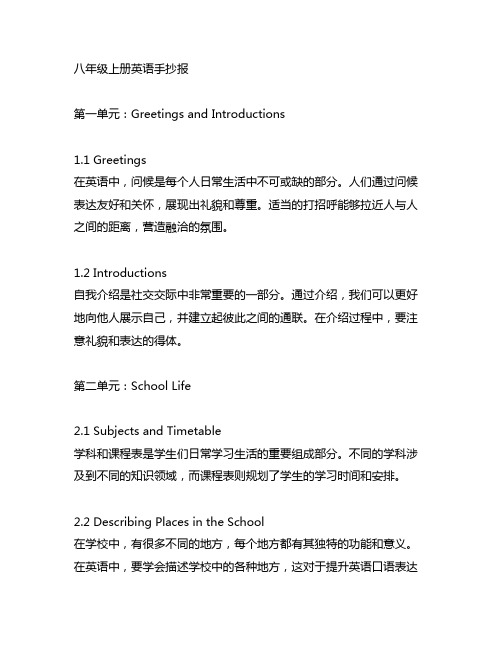
八年级上册英语手抄报第一单元:Greetings and Introductions1.1 Greetings在英语中,问候是每个人日常生活中不可或缺的部分。
人们通过问候表达友好和关怀,展现出礼貌和尊重。
适当的打招呼能够拉近人与人之间的距离,营造融洽的氛围。
1.2 Introductions自我介绍是社交交际中非常重要的一部分。
通过介绍,我们可以更好地向他人展示自己,并建立起彼此之间的通联。
在介绍过程中,要注意礼貌和表达的得体。
第二单元:School Life2.1 Subjects and Timetable学科和课程表是学生们日常学习生活的重要组成部分。
不同的学科涉及到不同的知识领域,而课程表则规划了学生的学习时间和安排。
2.2 Describing Places in the School在学校中,有很多不同的地方,每个地方都有其独特的功能和意义。
在英语中,要学会描述学校中的各种地方,这对于提升英语口语表达能力非常重要。
第三单元:Hobbies and Interests3.1 Hobbies爱好是每个人生活中的一部分,通过爱好可以让人放松身心,享受生活。
在英语中,要学会表达自己的爱好,并且能够和他人共享自己的兴趣爱好。
3.2 Booking a Ticket在日常生活中,订票是非常常见的事情。
无论是订票参加体育比赛,还是订票去看电影,都需要掌握一定的英语表达能力。
在学习这三个单元的内容时,我们不仅要掌握基本的词汇和语法知识,更要注重实际运用能力的培养。
希望同学们在手抄报的制作过程中,能够加深对这三个单元内容的理解,提高英语学习的兴趣和积极性。
希望同学们能够在日常生活中,积极运用所学知识,不断提升自己的英语能力。
4. Making Friends交朋友在每个人的成长过程中都是至关重要的。
而在英语学习中,能够用英语进行友好交流和建立友谊同样是非常重要的。
我们需要学会如何用英语介绍自己,并且主动与他人交谈。
- 1、下载文档前请自行甄别文档内容的完整性,平台不提供额外的编辑、内容补充、找答案等附加服务。
- 2、"仅部分预览"的文档,不可在线预览部分如存在完整性等问题,可反馈申请退款(可完整预览的文档不适用该条件!)。
- 3、如文档侵犯您的权益,请联系客服反馈,我们会尽快为您处理(人工客服工作时间:9:00-18:30)。
关于英语一二单元的手抄报
篇一:二年级英语手抄报作品
本文“二年级英语手抄报作品”中的图片如果太小,点击可以查看大图。
篇二:二年级英语手抄报设计
本文“二年级英语手抄报设计”中的图片如果太小,点击可以查看大图。
篇三:英语手抄报内容
英语手抄报内容
Alightheartliveslong.(williamshakespeare,british
dramatist)
豁达者长寿。
(英国剧作家莎士比亚.w.) earlytobedandearlytorise,makesamanhealthy,
wealthyandwise.(benjaminFranklin,Americanpresident)早睡早起会使人健康、富有和聪明。
(美国总统富兰克林.b.)
sloth,likerust,consumesfasterthanlabor
wears.(benjaminFranklin,Americanpresident)
懒惰像生锈一样,比操劳更能消耗身体。
(美国总统富兰克林.b.) Thefirstwealthishealth.(Ralphwaldoemerson,Americanthinker)
健康是人生第一财富。
(美国思想家爱默生.R.w.)
关于成功的英语手抄报内容Achievementprovidestheonlyrealpleasurein
life.(Thomasedison,Americaninventor)
有所成就是人生唯一的真正乐趣。
(美国发明家爱迪生.T.) buthasthelastwordbeensaid?Isallhopetobelost?Isthedefeatfinalno!(charles Degaulle,Frenchpresident)
但是难道败局已定,胜利已经无望?不,不能这样说!(法国总统戴高乐.c.)IsucceededbecauseIwilledit;Inever
hesitated.(bonapartenapoleon,Frenchemperor)
我成功是因为我有决心,从不踌躇。
(法国皇帝拿破仑.b.) Ifyouwishtosucceed,youshouldusepersistenceasyourgoodfriend,experienc easyourreference,prudenceasyourbrotherandhopeasyoursentry.(Thomased ison,Americaninventor)
如果你希望成功,当以恒心为良友、以经验为参谋、以谨慎为兄弟、以希望为哨兵。
(美国发明家爱迪生.T.) onlythosewhohavethepatiencetodosimplethingsperfectlyeveracquiretheski lltododifficultthingseasily.(Friedrichschiller,germanDramatistandpoet).
只有有耐心圆满完成简单工作的人,才能够轻而易举地完成困难的事。
(德国剧作家、诗人席勒.F.) powerinvariablymeansbothresponsibilityand
danger.(TheodoreRoosevelt,Americanpresident)
实力永远意味着责任和危险。
(美国总统罗斯福.T.)
successcoversamultitudeofblunders.(georgebernardshaw,britishDramatist) 成功由大量的失望铸就。
(英国剧作家肖伯纳.g.) Thepeoplewhogetoninthisworldarethepeoplewhogetupandlookforcircumst ancestheywant,andiftheycannotfindthem.theymakethem.(georgebernardsh aw,british
dramatist)
在这个世界上,取得成功的人是那些努力寻找他们想要机会的人,如果找不到机会,他们就去创造机会。
(英国剧作家肖伯纳.g.) Youhavetobelieveinyourself.That'sthesecretofsuccess.(charleschaplin,Am ericanactor)
人必须相信自己,这是成功的秘诀。
(美国演员卓别林.c.)
关于奋斗的英语手抄报内容
geniusonlymeanshard-workingallone'slife.(mendeleyer,Russianchemist) 天才只意味着终身不懈的努力。
(俄国化学家门捷列耶夫) Ihavenothingtoofferbutblood,toiltearsandsweat.(winstonchurchill,britishp olitician)
我所能奉献的没有其它,只有热血、辛劳、眼泪与汗水。
(英国政治家丘吉尔.w.)
manerrssolongashestrives.(Johanwolfganggoethe,germanpoetanddramatis t)
人只要奋斗就会犯错误。
(德国诗人、剧作家歌德.J.w.) myfellowAmericans,asknotwhatyourcountrycandoforyou;askwhatyoucan。
